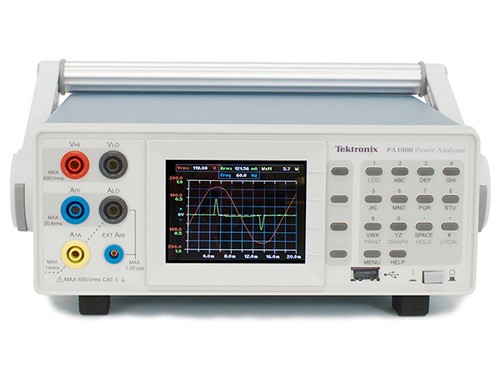

Your first prototype should be up and running. Now, it’s time to check your design to ensure that it complies with local power line standards.
Before we begin, it’s important to note that most AC-DC power supplies are designed to operate from an AC wall socket. Therefore, they are subject to rigorous power consumption and power quality standards, such as IEC 62301 standby power and IEC 61000-3-2 current harmonics standards. Compliance should always be tested early in the design cycle to help you avoid future headaches
In the video below, Tektronix engineer Seshank Malap shows you how to measure standby power on a cellphone charger using a Tektronix power analyzer to ensure your design complies with IEC 62301. It’s important to emphasize the need to double check your connections when measuring low and distorted standby power. Make sure you always connect the voltmeter channel on the source side of the current shunt so you don’t measure the current through the voltmeter impedance. This step is crucial, because incorrect wiring can lead to significant errors.
Virtually all electrical and electronic equipment that connects to the public mains, up to and including 16A rated input current, must comply with the IEC 61000-3-2. In the video below, Seshank demonstrates harmonics testing on a standard microwave oven using the PA1000 Power Analyzer with PWRVIEW software.
Tektronix offers affordable pre-compliance solutions to test for compliance with CE mark, ENERGY STAR, IEC standby and harmonics standards. The ideal instrument for budget-conscious design teams is the PA1000 Power Analyzer. This instrument has 20 uA current measuring capabilities that allow standby power measurements as low as 5 mW.

Tektronix PA1000 Power Analyzer
A must-have for compliance test applications is a Tektronix Breakout Box, providing two separate terminals for load and source side measurements. In addition, the box is easy and safe to use for accurate low-power reading for standby power testing.
In part 9 of our 10-part series we’ll take a look at EMI troubleshooting and pre-compliance testing. Also, for multi-channel testing for high-efficiency applications, explore our newest PA3000 Power Analyzer
See More Power Supply Measurement Tips in this 10-part series:
Part 1: Component Selection and Characterization for Power Supply Design
Part 2: Low-Voltage DC Circuit Power-On Test
Part 3: High-Voltage AC Circuit Power-On Test
Part 4: Digital and Analog Control Circuit Debug
Part 5: Testing Power Stage Switching Characteristics
Part 6: Switching and Conduction Loss Testing
Part 7: Power Supply Specification Check
Part 8: Power Line Compliance Testing
Part 9: EMI Troubleshooting and Pre-compliance
Part 10: Design Validation


